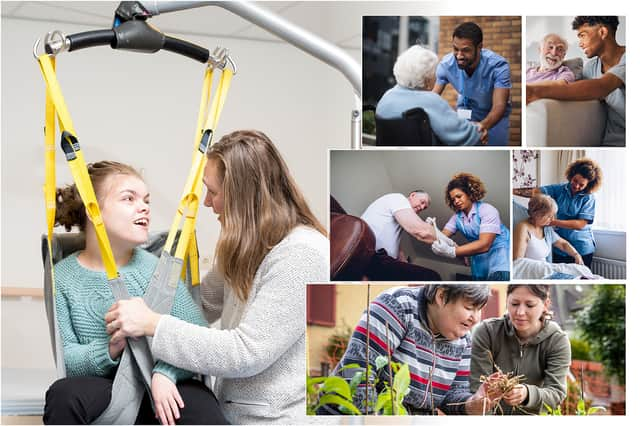A love letter to the UK's 5 million invisible caregivers on National Carers Week - including my partner
This article contains affiliate links. We may earn a small commission on items purchased through this article, but that does not affect our editorial judgement.
and live on Freeview channel 276
It takes a lot of emotional labour to care for someone else. Whether that’s a child, a parent, or even friends. But it’s a whole lot more when that care has additional needs baked into it.
Most people give me that “your partner sounds amazing” response, whenever I bring up the fact that he became part of my life after I had developed life changing, disabling symptoms. And of course I agree - to a degree. However, despite the external condescension from the able-bodied public, I am hugely grateful for the invisible caregivers this National Carers Week.
Advertisement
Hide AdAdvertisement
Hide AdThe week is an annual campaign to raise awareness and recognise the vital contribution that unpaid carers make to their families, communities and society as a whole. The event aims to highlight the challenges faced by carers and promote support for them. This year, it takes place between 5 and 11 June, with the theme being 'recognising and supporting carers in the community' - especially unpaid ones.
The charities supporting Carers Week 2023 are Carers UK, Age UK, Carers Trust, MND Association, Rethink Mental Illness, Oxfam GB and The Lewy Body Society. Together, they are calling on the government for better appreciation of unpaid carers so that they can access the key support they need to carry out their caring role.


According to the 2021 census data from the Office for National Statistics (ONS), there were approximately 4.7 million unpaid carers in England and approximately 310,000 unpaid carers in Wales. In Scotland, the number of carers is estimated to be around 700,000 to 800,000 from 2019 data. Carers UK estimated in June 2020 that an additional 4.5 million people had become unpaid carers since the pandemic began. They said that 2.8 million people who had started caring since the outbreak were also balancing paid work and care.
My partner was one of these statistics. As someone who had to shield for the majority of the pandemic, I was not the one to trudge through supermarket aisles with various tote bags, looking for loo roll and pasta. I also did not have to venture to the outskirts of the city to try to find said toilet paper and staple goods.
Advertisement
Hide AdAdvertisement
Hide AdWhen my arms decided to stop functioning for nine months during that time, and no hairdressers were available during lockdown, my other half became an expert coiffure. I presented myself as a professional in Zoom meetings, and absolutely no one had any idea this was happening behind the scenes. On the other hand, he continued to study and work, all while being a chauffeur, chef, and personal assistant. He was also often forgotten as a result.
Speaking to NationalWorld, Carers UK spokesperson Christine Casely said that the week is essential to recognise unpaid carers as part of the fabric of society. She said it was “an opportunity for people to think about the carers that they know. Think about what they can be doing to support carers”.
Christine Casely, Carers UK spokespersonan opportunity for people to think about the carers that they know
She added: “Whether that's the government, whether that's employers, whether that's in GP practices, recognising [a carer’s] role and thinking about ways that they can be supported to get support themselves is important.” Casely also talked about the “emotional toll”, especially as there is a considerable financial impact, and many can struggle to juggle work and care for a loved one. It can also affect a carer’s health and they are often unable to take breaks from the role.
Casely pointed to a new study by Carers UK and the University of Sheffield, which shows that unpaid carers in England and Wales contribute a staggering £162 billion per year to the economy, or as she puts it, the “equivalent to a second NHS.”
Advertisement
Hide AdAdvertisement
Hide AdAnd I agree: with the hours and hours my partner puts in every week cleaning and cooking, it easily equates to another job.
So this Carers Week, a time of acknowledging those who usually go unacknowledged, I want to say thank you to my carer – in the words of your favourite Barry White song, you’re the first, you’re my last, my everything.
Comment Guidelines
National World encourages reader discussion on our stories. User feedback, insights and back-and-forth exchanges add a rich layer of context to reporting. Please review our Community Guidelines before commenting.
